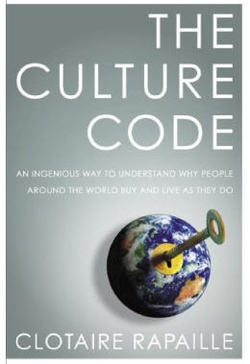 W ramach naszej serii książek o marketingu zrecenzowaliśmy książkę Clotaire'a Rappaille'a „The Culture Code”. W badaniach marketingowych Rappaille znany jest ze swojego stylu i unikalnych teorii na temat zachowań człowieka. Znany jest z odrzucenia tradycyjnej grupy fokusowej; zamiast tego proponuje 3-godzinną grupę fokusową, w której przeprowadza niestrukturyzowane badanie niejasnych pytań, aby wywołać głęboko zakorzenione emocje i postawy. W książce mówi o tym, jak kultura ma kod dla każdego pojęcia i że zadaniem marketingowców jest dekodowanie tych znaczeń.
W ramach naszej serii książek o marketingu zrecenzowaliśmy książkę Clotaire'a Rappaille'a „The Culture Code”. W badaniach marketingowych Rappaille znany jest ze swojego stylu i unikalnych teorii na temat zachowań człowieka. Znany jest z odrzucenia tradycyjnej grupy fokusowej; zamiast tego proponuje 3-godzinną grupę fokusową, w której przeprowadza niestrukturyzowane badanie niejasnych pytań, aby wywołać głęboko zakorzenione emocje i postawy. W książce mówi o tym, jak kultura ma kod dla każdego pojęcia i że zadaniem marketingowców jest dekodowanie tych znaczeń.
Rapaille przedstawia 5 głównych zasad, które zaprzeczają jego podejściu do badań marketingowych.
Principle 1: You can’t believe what people say
Rappaille cites an example of unearthing the notion that cars have attached to them underlying sexual desires. He recalled focus groups about cars, wherein respondents recalled experiences of their hormone-driven adolescence. He also cites as evidence that fact that dreams are forgotten in short period of time. His recommendation is that marketers have to go beneath the surface.
Principle 2: Emotion is the energy required to learn anything
Rappaille states that people learn when emotion is involved. An example given was the learning experience a child receives when she burns her hand on a stove for the first time. Hence marketers should tie exposure of the product to emotion to influence behavior.
Principle 3: The structure, not the content is the message
Rappaille cites the fact that when people are looking for unconscious messages, the form and detail becomes unimportant. In other words, it is the story’s structure that is important. His point: a single musical note is unimportant compared to the overall structure of the space between the notes and the range between each note.
Principle 4: There is a window in time for imprint and the meaning of the imprint varies from one culture to another
Rappaille explains from his background in behavioral learning that strong imprints are made on children before the age of 7, especially in reference to culture. Likewise, the meaning of champagne will have different meanings to a French child than to an American child.
Principle 5: To access the meaning of an imprint within a particular culture, you must learn the code for that imprint
Products will have different meanings across cultures. For example, the American code for cars is individualism, whereas the German code for cars is Superior Engineering.
A few interesting cultural codes based on consumer research:
American culture code for love = FALSE EXPECTATION
American culture code for seduction = MANIPULATION
American culture code for sex = VIOLENCE
American Culture code for work = WHO YOU ARE
American Culture code for money = PROOF
American culture code for America in Germany = JOHN WAYNE
American culture code for America in France = SPACE TRAVELERS
American culture code for America in UK = UNASHAMEDLY ABUNDANT
Ultimately, Rapialle concludes by stating that companies attempting to capture a new market need to connect with the Code. This is because people within other cultures see in these codes something they long for and missing from their lives.
Rapaille’s book is interesting in teaching the differences in meanings attached to products across cultures. Yet the book reduces differences between cultures into very simplistic statements that can be neither supported nor rejected. Furthermore, the codes are presented in by way of anecdotes, problematic when trying to evaluate the authenticity of such large claims. The real value in Rapaille’s book, it seems, is decoding the right message that will resonate in promoting a product and pushing researchers to get to deeply rooted attitudes.


